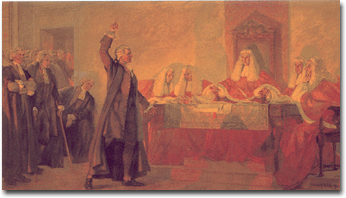As some prepare to don the stars and stripes in all tasteless manners of irony, and speak sarcastically and casually about concepts such as freedom; and as others, who opt for less cloying displays, prep the grills and check provisions in advance of the day when they too will traffic in fatuous tropes of American exceptionalism, a discord between the history of this day, and American’s current posture towards an expansive surveillance state, proves too astoundingly tragic an irony to ignore.
To combat the illicit smuggling enterprises of many British colonists in North America, the British government gave its colonial customs agents excessive latitude to search the stores and homes of its subjects. Writs of assistance were court orders, granting anyone in their possession the legal authority to search the property of those deemed suspect. James Otis, formerly the high ranking Advocate-General for Britain in the American colonies, resigned his position in protest and challenged the legality of such warrants on the premise that they were “universal” and “directed to every subject in the King’s dominions.” There was no oversight of the process, nor was there an obligation on the part of the customs officials to demonstrate suspected wrongdoing. The writs were largely viewed by the colonists as gross violations of their rights, and soon joined a growing list of grievances ultimately culminating in the severance of political bands that is joyously commemorated today.
British colonists did not respond to the nameless and indefinite warrants with exhortations that “if one has nothing to hide, one has nothing to fear.” Yet, despite the deafening chorus hailing the principles of July 4th, recent polling demonstrates that this is precisely the reaction most Americans appear to be having to the recent disclosures of N.S.A. surveillance.
The Verizon dragnet data accumulation program—in a manner similar to the writs of assistance—effectively treats every American as a potential suspect, in clear violation of the spirit, if not the language, of the 4th Amendment. Simply because it is less physically invasive than the writs makes it no less problematic. At the heart of America’s collective shoulder shrug to the N.S.A. revelations is a betrayal of a notion that would have been fundamental to most of the founding generation who fought beneath the banner of revolution: human beings are flawed, power hungry, and therefore mightily susceptible to abuses in pursuit of their aims. Our institutional frameworks and safeguards reflect these ideas.
We surely have not evolved, or matured, to render these notions quaint or irrelevant. Yet the surveillance apologists in the media and in the congressional “oversight” committees have responded as if our leaders are without these shortcomings, or frailties; that they are somehow immune to the corruptions and delusions of grandeur that often court abuses. It is precisely because human beings are vulnerable to the tantalizing idea of total security that we must erect and respect the barriers to it! Only a naïf would believe this gold mine catalogue of daily human interactions will remain confined to the province of select intelligence analysts in one executive branch department. No. These programs, and their contents, naturally, inevitably, will be repurposed, by other agencies, for other “useful” aims. The temptation is too great to resist. Simply put: These are powers no democratic republic should possess.
This year’s July 4th is then a most timely celebration, ripe for citizens to apply its relevance to our own government’s manufacturing of warrants to obtain information so broad, and unspecified, that King George himself would have blushed. We have not survived this long as a nation on the hope of virtuous leaders, but instead on the laws that constrain them. Should complacence, deeper cynicism, or apathy be our response, we affront the ideals and sacrifices of those early Americans in celebrating what has become yet another American holiday, stripped bare of its meaning, sacrificed to our indulgence, laziness, and self-satisfaction.
Matthew Brian Goldman played in the indie-rock band Steel Train. He now teaches Legal Studies in Brooklyn, N.Y. and blogs at Oh, Freedom….








2 comments
John Haas
“No. These programs, and their contents, naturally, inevitably, will be repurposed, by other agencies, for other “useful” aims.”
One danger of fondling your fantasies is you can end up treating them as evidence.
Chris Schumerth
Thanks for this. Would actually love to see FPR engage in some conversation about Mr. Snowden himself. Forgive me if it’s taking place elsewhere and I’m missing it. But I would be interested in the different perspectives out there from FPR readers (and writers).
Comments are closed.